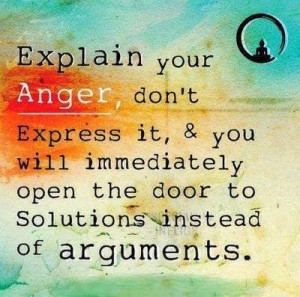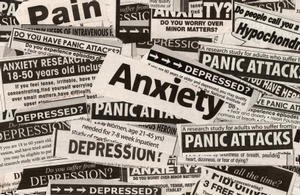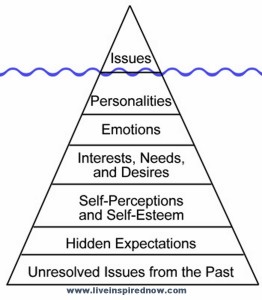Have you ever felt really angry, frustrated, or irritated and then you ended up lashing out at people because of it? There is a way to have those feelings without causing so much damage and it is really simple. Learn to explain your non-positive feelings instead of expressing them!
Explaining how you feel (in a calm tone) rather than expressing yourself (using elevated tones and body language) makes it more likely that other people will listen and actually hear what you say. How many times have you said something in anger and the other person heard it in a way that was much worse than you intended? Your voice tone and body language are far more influential than the actual words you are saying.
You might yell “I am so irritated by you, why don’t you ever put the lid back on the toothpaste when you’re done?” But what the other person hears is “I hate you, you never do anything right!” It sounds crazy now as you read it, but this is so common! I hear from couples all the time about this. They hear the intention in the voice tone rather than the actual words and it causes bigger problems.
If you choose to explain your non-positive feelings, in a more calm manner, you can get your point across with a better chance of avoiding miscommunications. Try talking about your feelings instead of yelling, screaming, or judging and see how your communication changes! Feel free to express joy, elation, curiosity, and other happy emotions but explain the rest! See how your life, your relationships, and your stress levels change with this easy tip and Live Inspired Now!
Buy “Live Inspired Now; A Field Guide For Happiness” today and get practical inspiration for your happy life!!!
Heather Paris inspires people all over the world to create happier lives through talks, workshops, blog posts, and her book, Live Inspired Now; A Field Guide For Happiness. For more information about transforming your relationship, family, or your life, contact Heather today!
It can be challenging when someone you love has anxiety. You might not know what to do, or how to react during their anxiety or panic attack. Everyone is different but here are a few tips to help you cope when someone you care about is dealing with anxiety.
1 Be compassionate: Make an effort to understand where the anxiety is coming from. First of all, know that is not about you, but rather, how they are feeling about a situation. For example, they may have parenting anxiety and get upset when they don’t know what to do about a child that won’t stop crying. Understand that they might be concerned for the child’s safety, it may be rational or irrational, but to them it is very real. Because they can’t stop the child’s crying, they feel overwhelmed and out of control. Trying to understand where the anxiety stems from and realizing it is not about you will help you feel more compassionate toward the person suffering.
2 Resist the urge to engage: Make an effort to avoid getting sucked in. No matter how much someone is stressing out, you have the choice to remain calm. Imagine if the EMT (Emergency Medical Technicians) workers arrived at a car accident and they all started screaming and freaking out; nobody would ever be rescued. Picture yourself as an EMT worker, and you are there to help and remain calm during the crisis. You might not be able to “help” but by remaining calm, you can prevent the situation from becoming worse.
3 Take a deep breath: Simple, I know, but most people forget this in the moment. Find peace in taking nice deep breaths, it will help to keep you grounded and focused.Make sure to breathe deeply enough to make you consciously acknowledge your diaphragm moving.
4 Validate their feelings and offer to help if you can: Say something like “I see that you are upset, how can I help?” or “I see you are struggling, would you like to talk about it?” They may not want your help (and that is OK), but at least you are making an effort to understand and help.
5 Walk away if you need to: If you find that you are unable to avoid reacting, or over-reacting, then simply walk away. Explain later that you had to get away, but it’s better to walk away than to pour gasoline on the fire. Create healthy boundaries, even with people who are very close.
6 Communicate: Give everyone enough time to cool down, then talk about the situation. Talk about how the situation might have been handled differently, and express how you were feeling. You can even talk about creating an action plan for future anxiety attacks. Your loved one might appreciate you just taking a step back and not doing anything when they are anxious. Or they might have a specific phrase that you can say that will let them know you are there for them. Communicate honestly and openly with one another and you will get through anything!
7 Lay your weapons down: Pointing out your loved ones weaknesses will not help them. It can be scary and frustrating when your loved one is having an anxiety or panic attack. However, yelling at them, or judging them will never help them get better. If you want to express your love for them, create a safe place for them to be honest and open with you about what is going on. Encourage them to seek professional help. Offer to be supportive and continue to encourage while they are learning to overcome anxiety. Anxiety is not something you can just “stop doing” or “just focus on something else.” It takes professional help to overcome so encourage your loved one to reach out for help. Note: many people are far more receptive to seeking help from a “life coach” rather than from a “therapist”.
Most of all, do your best. We are not perfect, nor will we always react perfectly when someone we love is in crisis. Don’t beat yourself up about it. Do your best, ask for help if you need it, learn as much as you can, be supportive and kind without compromising yourself, and Live Inspired Now!
Heather Paris inspires people all over the world to create happier lives through talks, workshops, blog posts, and her book, Live Inspired Now; A Field Guide For Happiness. For more information about transforming your relationship, family, or your life, contact Heather today!
I spent years listening to the opinions and unsolicited advice of others about how to parent my children and I thought I would address some of these things here. Now, I never said anything in the past, maybe I should have, but I am saying it now in an effort to help other parents. Parents who listen to the barrage of opinions, advice, criticism, and judgements of others. Parents who quietly go about their business without ever saying anything yet feel hurt inside. Parents, like I was, who need encouragement and support, not fear and manipulation… from anyone!
Here are some of the things I endured from others. Does any of this sound familiar?
What is it about pregnancy that makes people crazy? Everyone seems to have an opinion on how to harm or kill your own baby. I was told not to put my arms up over my head or I would cause the umbilical cord to wrap around the baby’s neck. I was told what to eat, what not to eat, how to sleep, walk, and even work. My favorite by far though was the constant advice on how to feed my baby once she was born. I had half the population telling me that I was irresponsible and not giving my baby the best chances in life if I didn’t breast feed. Whilst the other half of the population, mostly family, telling me that breastfeeding was disgusting and an embarrassment. How was I to succeed?
The next hurdle came when I was to have a son. I do not believe in circumcision and so the obvious choice for me was not to have my child circumcised. This was clearly the worst offense I ever committed as a parent. I was berated, insulted, and even yelled at. Someone close to me actually told me that “one day your son will come to you as a teenager and tell you that he hates you for what you have done.” Wow, just wow.
Madison, my first child, was a bit of a wild one! She was fearless, spontaneous, and very strong willed. She was a handful and often I was told by friends and family to “hit her.” I was told that my discipline style was not severe enough and that she was sure to turn out like an uncontrollable monster who would most likely be “knocked up” by 16, if I didn’t “spank her ass.” Regrettably, once I did actually try spanking her little bottom which left me in tears, while thankfully, Madison was completely unscathed and unaffected by my attempt. I was told that clearly, I didn’t hit her hard enough. I never tried again.
I was also a terrible parent for teaching my children about “choices.” I used to use the phrases “that was not a good choice” or “it’s your choice, but there are consequences,” as opposed to “your bad!” To the “choice” comments, I was told that kids don’t have choices, it was up to ME to make their choices, and I was giving them too much control, and my approach was “stupid.”
I also made it safe for my kids to talk to me… about ANYTHING. So while their friends were sometimes engaging in really risky behavior, our house was the safe zone. Our house was the place where kids could come and speak with “another Mother” (me) who would help and encourage without the judgement and ridicule. For the safe haven I offered, I often had a target on my back. Not many people, especially friends and family, want to offer you praise or thanks for doing the job they couldn’t.
I am here to tell you my children have turned out wonderfully. Now, not all of them are full grown and out of the house yet, so I supposed they could still hate me someday, but I am going to go ahead and take a chance to say that they have turned out awesome! Madison is 19, in the Air Force, and happy. I am happy to say she wasn’t “knocked up” at 16, nor did she sprout horns and become a demon. Harry is happy, successful, creative, and he likes me. Carrie seems to make really good “choices,” and is a very compassionate child. I have applied all of my “horrible parenting techniques” to my step children as well, and they love me too.
So my dear readers, parents, friends, family, and others: Don’t listen to the negative offerings of others. Don’t let someone else scare you into parenting in a way that you don’t agree with. Don’t let the hurtful words of others convince you to do something you think is wrong. Please follow your own hearts, heads, and higher selves. Surround yourself with people who inspire, encourage, and offer support. Believe me when I say that it WILL all work out. Do your best, love your children, never compromise yourself or your kids and Live Inspired Now.
PS: Would you like to learn more about my work with kids, both my own, and the kids I work with? My book ‘Live Inspired Now: A Field Guide For Happiness’ is full of great stories, life lessons, and quick tips about everything from parenting, to relationships, to finding your perfect mate, and more! Get an autographed copy right here on my site! Happy New Year Friends! 🙂
Heather Paris inspires people all over the world to create happier lives through talks, workshops, blog posts, and her book, Live Inspired Now; A Field Guide For Happiness. For more information about transforming your relationship, family, or your life, contact Heather today!
Unexpressed emotions lead to anger. Anger turns to resentment. Resentment kills relationships. People come to me all the time saddled with heavy emotional baggage that they have been carrying around for far too many years. Their relationships are suffering and they feel angry all the time but, don’t really know why. People use anger as a “go to” emotion for a multitude of reasons. Often times, this is because they don’t feel safe expressing sadness; they think it is a weakness. Or, because they don’t want to say something and “rock the boat.”
In order to maintain long term, happy relationships, you must make time to express your true feelings. I would add, that you must allow your partner to feel safe enough to be completely honest. Feelings or emotions that go unresolved will always lead to resentment if you don’t find an outlet to discharge. Talk open and honestly with the people in your life, if you don’t feel safe enough to do that, then perhaps you should re-think the relationship.
For example:
Your spouse makes a rude comment that they thought was funny and not meant to be hurtful.
It hurts your feelings but you say nothing.
The spouse learns (by your silence) that this is an acceptable way to joke and continues.
With every joke you feel more sad, hurt, targeted, isolated, frustrated, until it all turns to anger.
You are re-stimulated and remember ALL the rude comments every person ever made to you.
Your anger becomes overwhelming until you lash out.
A fight ensues (usually with a topic other than the original comment).
This could have been avoided if you expressed that your feelings were hurt by the first rude comment.
For example:
Your spouse makes a rude comment that they thought was funny and not meant to be hurtful.
It hurts your feelings and you express it: “I know you didn’t mean to, but that comment actually hurt my feelings.”
Your spouse gets the opportunity to apologize and make things right.
Expressing your feelings before they turn into anger is the key! You might not always get the response you wish for in exchange for your openness, but you will be able to leave the baggage behind you and know that you didn’t let yourself down by failing to acknowledge your feelings. When you express your feelings, you unconsciously acknowledge and validate yourself as a person of worth.
So today, don’t let emotions go unexpressed. Boost your self worth, strengthen your relationships by saying what you feel, and Live Inspired Now!
PS: There is an entire chapter in my book about discharging emotions and leaving the BS baggage behind! Buy an autographed copy today…. on the right hand side of this page!
Heather Paris inspires people all over the world to create happier lives through talks, workshops, blog posts, and her book, Live Inspired Now; A Field Guide For Happiness. For more information about transforming your relationship, family, or your life, contact Heather today!





